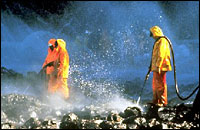Climate Technology
All Stories
-
Getting a toehold on your company’s climate footprint
“What’s your company’s climate footprint?” It’s a hot question these days — one being asked increasingly of companies by customers, investors, activists, regulators, and others. OK, it may not be exactly that question, but it’s probably in some form, like, “What’s your company doing to reduce its climate impacts?” Or, “How do you call yourself […]
-
-
Yukon Fool Some of the People Some of the Time
GM builds world’s first LEED-certified auto plant, slows SUV production If BP went Beyond Petroleum, does that mean GM is Greening Motors? The struggling U.S. automaker recently unveiled two nuggets of eco-friendly news. Its brand-spankin’ new Lansing Delta Township assembly plant in Michigan received the U.S. Green Building Council’s gold LEED (Leadership in Energy and […]
-
To Tech With It
Investment money pours into the green-tech sector Investors are ga-ga for green. In 2005, clean energy projects in the U.S. were showered with $17 billion in investment money, up 89 percent from 2004. Just in 2005, the worldwide market for carbon credits blossomed from essentially nothing to around $11 billion. And these are not just […]
-
Wal-Mart’s green makeover
I have an op-ed on TomPaine.com today about Wal-Mart's recent green initiatives. Give it a read. I'm sure the accusations of corporate whoredom will come rolling in at any moment.
I worry that, even given the copious pixels expended, my overall point was not entirely clear. So below the fold, I shall try to express it in more compact form.
-
Wal-Mart’s devious profit motive
I'm in the midst of writing an op-ed about Wal-Mart's green transformation. One theme that comes up frequently in the commentary is this: Wal-Mart is "only" doing these things because they'll improve the bottom line.
Um ... yeah.
It's a business. It's supposed to make money. As a publicly held corporation, it's required by law to make money. If it went around doing things that deliberately reduced its profits, it would be subject to a shareholder lawsuit.
The whole point of the green business trend is that green makes business sense. Reducing waste is good management. What kind of bizarre message does it send if a business sees the light on this issue only to be told that they get no credit because their motivations are financial?
Sometimes I'm just not sure what greens expect.
-
Wal-Mart and culture
This NYT piece about Wal-Mart's failure to fit in culturally in various of its international conquest states is just fascinating. Apparently wanting everything available in one place, at the lowest possible price, in huge impersonal stores is not a fundamental feature of human nature, but a cultural artifact. In Germany, for instance, the company is just giving up entirely.
Trolling through the article, I pulled out these nifty tidbits:
-
Which is thicker, blood or oil? A longtime shareholder reflects
My family has been intimately involved with Exxon through the years. My great-great-grandfather Maurice Clark went into the provisioning business with John D. Rockefeller around the time of the Civil War, but ended up selling the nascent oil-refining part of the business to Rockefeller in the late 19th century. Years later, my grandmother’s uncle ran […]
-
The Station Agent
Chicago Tribune series traces a gasoline fill-up to its source Told that tracking gasoline from a single gas station back to its sources was impossible, reporter Paul Salopek did it anyway. In compiling a multimedia series for the Chicago Tribune, Salopek sourced gas dispensed at a Marathon station in South Elgin, Ill., to the Gulf […]
-
Are the world’s green-biz supermen losing their powers?
It’s early yet to begin writing the business obituary of long-standing BP CEO Lord John Browne, slated to retire in 2008. But the man once billed as the closest thing to a green Superman has had his cape singed recently. Have we been duped? Could anyone reading BP’s annual sustainability reports the last few years […]


